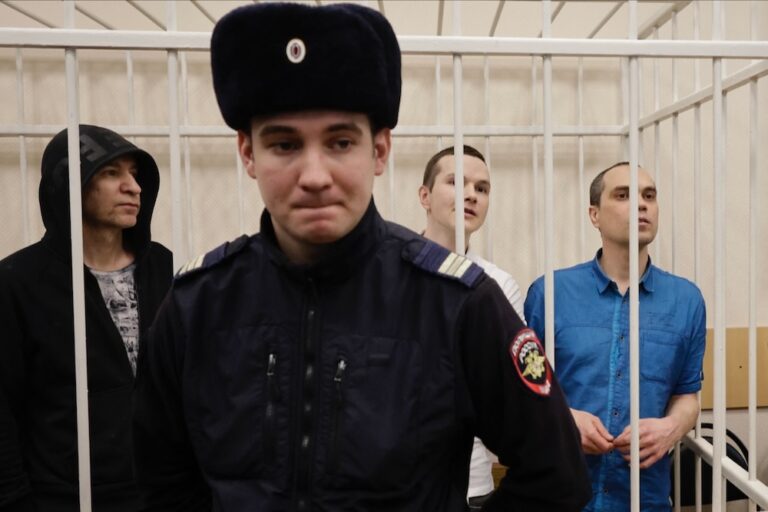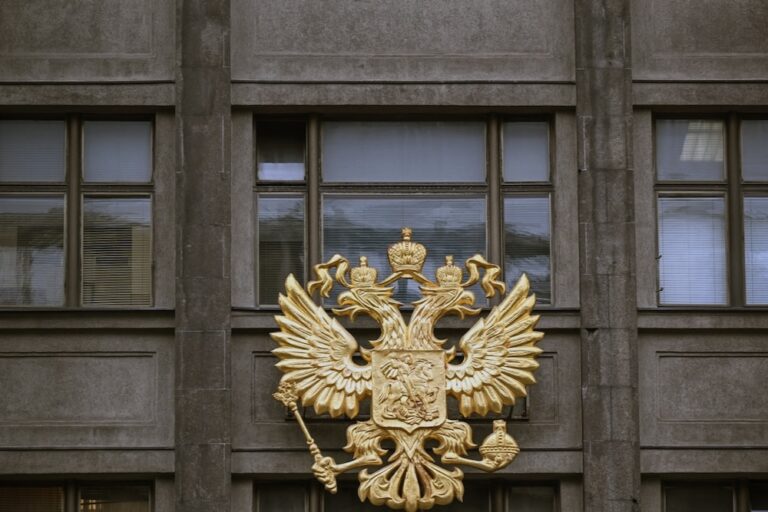(Freedom House/IFEX) – The following is a 29 May 2003 Freedom House press release: NEW REPORT DETAILS DISTURBING DEMOCRACY DECLINE IN RUSSIA President Bush Urged to Place Russia’s Democratic Performance on Summit Agenda NEW YORK, May 29, 2003 — Freedom House today released a detailed report that reveals significant deterioration of rights and freedoms in […]
(Freedom House/IFEX) – The following is a 29 May 2003 Freedom House press release:
NEW REPORT DETAILS DISTURBING DEMOCRACY DECLINE IN RUSSIA
President Bush Urged to Place Russia’s Democratic Performance on Summit Agenda
NEW YORK, May 29, 2003 — Freedom House today released a detailed report that reveals significant deterioration of rights and freedoms in Russia and called on President Vladimir Putin to take steps to address critical issues of concern, particularly in the areas of free and fair elections and freedom of expression.
Freedom House urges President Bush to raise Russia’s democratic performance as a priority issue for discussion during his June 1, 2003 meeting with President Putin in St. Petersburg. Specifically, Freedom House calls on President Bush to press the Russian leader to ensure free and fair parliamentary elections later this year in which voters have broad choice, media are free to provide full and balanced coverage, and candidates have equal campaigning opportunities.
The report, included in Freedom House’s latest Nations in Transit (NIT) survey, indicates that Russia has lost considerable ground in its protection of basic political rights and civil liberties over the last seven years. Despite showing some improvements in 2002, Russia has experienced an overall decline since 1997 in most key areas tracked: electoral process; civil society; independent media; governance; and constitutional, legislative, and judicial frameworks.
The full Russia report is available at:
http://www.freedomhouse.org/pdf_docs/research/nitransit/2003/nitrussia2003.pdf
A Russian language version of the report is available at:
http://www.freedomhouse.org/pdf_docs/research/nitransit/2003/nitrussian2003.pdf
NIT general findings are available at:
http://www.freedomhouse.org/pdf_docs/research/nitransit/2003/nitcharts2003.pdf
“The long-term trends in Russia are disturbing,” noted Freedom House Executive Director Jennifer Windsor. “Elections remain marred by serious irregularities. Independent journalists fear retribution for solid, investigative reporting. Corruption continues to pervade all aspects of political and economic life in the country. Russia’s leaders have simply failed to seize the historic opportunity of Communism’s collapse to fully protect basic rights and institute the rule of law.”
Ms. Windsor called upon President Bush to raise the concerns over continued poor performance in democracy and human rights in their upcoming meeting in St. Petersburg, and “to make clear that stable and cooperative U.S.-Russian relations ultimately depend on genuine democratic consolidation within Russia.”
Overall, throughout the 27 post-Communist countries in Central and Eastern Europe and the New Independent States, Freedom House found more gains than setbacks in the last year in terms of the region’s progress in democratization and implementation of the rule of law. Nations in Transit 2003 is produced by an international team of over thirty U.S. and European analysts, and its findings are reviewed by a dozen eminent academics and scholars.
The Nations in Transit report documents a pattern of disturbing trends within Russia, including:
– President Putin’s methodical efforts to concentrate power around him and to intimidate and co-opt political opponents;
– The absence of truly free and fair elections and viable opposition political parties;
– A civil society that remains sidelined in public policy and decision making and lacks the support and resources needed to sustain its activities;
– A press that is under challenge and fears retribution for legitimate criticism of the government and honest reporting on crime and corruption;
– A weak judiciary that lacks independence and is unable to enforce its decisions; and
– The hijacking of Russia’s wealth by an elite group of oligarchs and the corruption and extortion that pervade life in the country.
According to the report:
“As the Russian Federation embarks upon its second decade of post-Soviet independence, there is widespread concern in the West about the country’s lack of commitment to democratic consolidation. Although Russia is an electoral democracy in which the citizenry possesses formal political rights, such as the right to vote and to compete in elections, real power is found not in the competing branches of government or the interplay of political parties, but in the proximity of groups to the executive. Civil liberties are even less secure?. Overall, the country still lags behind its Central and Eastern European neighbors in terms of democratization, economic liberalization, and establishment of the rule of law.”
A separate Freedom House report on Chechnya tracks Moscow’s ongoing and wide-scale human rights abuses in its military campaign in the breakaway region. The report is available at:
http://www.freedomhouse.org/pdf_docs/research/nitransit/2003/chechnya2003.pdf
Nations in Transit 2003: General Findings
Throughout the region, most improvements documented this year were confined to the countries of Central and Eastern Europe and the Balkans. With the exception of the Baltic region, the majority of countries in the former Soviet Union continued to lag behind.
The general findings are available at:
http://www.freedomhouse.org/pdf_docs/research/nitransit/2003/nitcharts2003.pdf.
“The results of this year’s study provide added proof that democratic consolidation continues in a vast region that knew few freedoms just a decade ago,” noted Amanda Schnetzer, a senior fellow at Freedom House and an editor of the study. “Unfortunately, the gains have been uneven and Russia in particular should be called to task for failing to lead by example in the post-Soviet space. Its message to other leaders in the region appears to be that democracy isn’t a genuine priority.”
The Nations in Transit survey, produced annually, provides comprehensive analysis of post-Communist transitions by tracking changes in electoral processes; civil society; independent media; governance; corruption; and constitutional, legislative, and judicial framework. It also provides a unique set of comparative ratings and averaged scores for democratization and the rule of law. The ratings are based on a scale of 1 to 7, with 1 representing the highest level of democratic development and 7 the lowest.
Gains:
– Democratization. Only one country, Bosnia, registered significant improvements in the democratic processes tracked by Nations in Transit. Ten additional countries registered some positive movement in the democratization category: Azerbaijan, Czech Republic, Hungary, Macedonia, Romania, Slovakia, Slovenia, Ukraine, and Yugoslavia (Serbia and Macedonia).
– Rule of Law. Six countries experienced notable improvements in the rule of law category: Albania, Bosnia, Hungary, Lithuania, Russia, and Ukraine. An additional five countries also noted more modest positive gains: Bulgaria, Czech Republic, Macedonia, Romania, and Yugoslavia (Serbia and Macedonia).
Setbacks:
– Democratization. Three countries lost significant ground in 2002: Georgia, Kazakhstan, and Kyrgyzstan. Seven countries experienced more modest declines: Armenia, Belarus, Bulgaria, Croatia, Moldova, Poland, and Russia.
– Rule of Law. Three countries also experienced notable setbacks in the rule of law category: Croatia, Georgia, and Moldova. An additional four countries saw more minor setbacks: Belarus, Kazakhstan, Kyrgyzstan, and Poland.
Regional Trends and Highlights
Central Asia. Although many observers expected that an enhanced U.S. military presence and increased foreign aid would lead to positive domestic developments in the countries of Central Asia, little if anything has changed on the ground. Indeed, the situation has deteriorated in many respects. This year’s Nations in Transit study documents particularly disturbing setbacks in Kyrgyzstan and Kazakhstan. As the report on Kyrgyzstan notes, “Throughout 2002, the regime led by President Askar Akayev? used direct and indirect pressure to silence its vocal opponents.” In Kazakhstan, President Nursultan Nazarbaev and other top regime figures found themselves under investigation in the West for corrupt practices, while independent journalists and civil society activists feared retribution for their activities as the government “intensified a clampdown on political activists and members of the media who expose official corruption by incarcerating them on false or trumped-up legal charges.”
Caucasus. The Caucasus also presented a negative picture in 2002. In Georgia, local elections were characterized by violence and voting irregularities, and independent journalists were often under attack. The Nations in Transit report on Georgia details a highly unstable territorial administration, weak institutional foundations, and anti-corruption measures that have proven ineffective. Corruption is identified as a “major obstacle to political and economic development.” Armenia remained a “struggling nation with enormous socioeconomic difficulties, unresolved security issues, and a deeply flawed political order.” Many observers considered the loss by the popular A1+ television channel of its air frequency to have been politically motivated; A1+ often aired criticism of the Armenian government. Although Azerbaijan showed a slight improvement in its Nations in Transit score for democratization–largely owing to increased civic activism and the willingness of NGOs to take their complaints against the government to international bodies such as the Council of Europe–2002 was largely characterized by a pessimistic tone in negotiations on the settlement of the Nagorno-Karabakh conflict, speculation about possible presidential succession scenarios, and a national referendum on constitutional amendments that was characterized by fraud.
Western CIS. Although Russia and Ukraine both showed improvements in the rule of law category in 2002, overall both countries have exhibited more regression than forward movement over the life of the Nations in Transit study. In the six transition categories Freedom House tracks, Russia has experienced overall declines in all but one (corruption) since the organization began rating post-Communist reform in 1997; Ukraine has experienced declines in all but two categories (civil society and corruption). Freedom House did note that in 2002, there were steps forward in Russia, including the passage by parliament of numerous laws designed to reform the judicial system and fight corruption. Ukraine’s parliament also approved a series of laws and measures designed to reform the country’s economy and legal system. In both cases, it remains to be seen whether these legislative efforts will have a significant impact on the severe problems facing the countries. Moldova also experienced serious setbacks, largely owing to the efforts of parliament and the government to suppress judicial independence and dampen political pluralism in the country.
Southeastern Europe. With some exceptions, the countries of Southeastern Europe experienced forward movement in 2002. Although international intervention in Bosnia remained substantial and nationalist parties gained power, 2002 still saw a number of positive steps, including constitutional changes that formally ended discrimination against non-dominant ethnic groups in the protectorate’s two entities. Voters also participated in the first national elections organized solely by Bosnian, rather than international, authorities. Bosnia was also accepted into the Council of Europe. In contrast, Croatia appears to have stagnated, if not backtracked, in some respects. In particular, Croatia’s judiciary has shown little willingness to reform and has largely failed to prosecute war crimes cases as required by law. Macedonia showed some positive signs of recovery from its domestic insurgency in 2001, particularly in the holding of free and fair parliamentary elections. Yugoslavia, now officially recognized as Serbia and Macedonia, exhibited some forward movement in civil society, the media, and anti-corruption efforts, but was largely characterized in 2002 by stalemate and deadlock on the political front. Albania made the fight against corruption a top priority in 2002 and outlined a detailed plan for pursuing reforms in areas such as public administration, public financing, and overall transparency in government.
Central and Eastern Europe. The year 2002 proved historic for most of the countries of Central and Eastern Europe, as 7 received formal invitations to join NATO and 8 to enter the European Union. The progress achieved by these countries since the collapse of communism is reflected in Nations in Transit by overall positive movement over the life of the study. Several countries showed improvements in 2002, including Hungary, the Czech Republic, Lithuania, Romania, Slovakia, and Slovenia. Both Lithuania and Hungary showed notable improvements in the rule of law category in 2002, largely for stepped-up efforts to combat corruption. Although Poland remains at the top of Freedom House’s democratization rankings, some negative tendencies in 2002 are worth noting. Particularly worrisome was the strong showing of populist and nationalist parties in the 2002 local elections and their uncivil behavior in parliament throughout the year. Also problematic was the perceived increase in the politicization of Polish media. Evidence suggested that mainstream opposition parties were receiving little coverage on public television, and efforts by the government to limit the concentration of media ownership drew concern from press freedom advocates who worried that the actions were politically motivated.
Freedom House, a nonprofit, nonpartisan organization, conducts an array of U.S. and overseas research, advocacy, education, and training initiatives that promote human rights, democracy, free market economics, the rule of law, independent media, and U.S. engagement in international affairs. In addition to the annual Nations in Transit survey, Freedom House also publishes Freedom in the World, an annual global survey of political rights and civil liberties, and the Survey of Press Freedom, an annual global survey of press freedom. For more information, visit http://www.freedomhouse.org.


